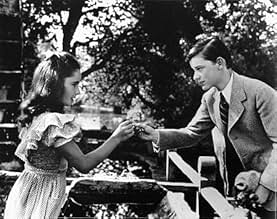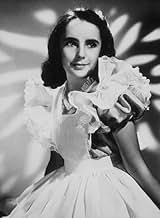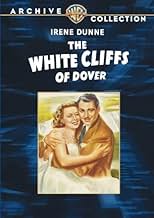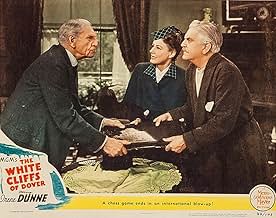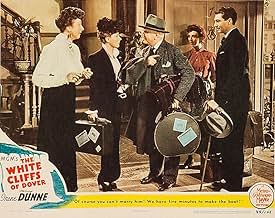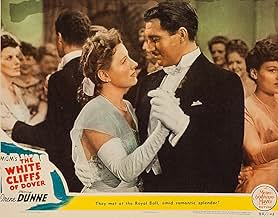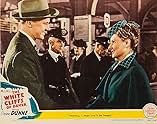CALIFICACIÓN DE IMDb
7.0/10
1.9 k
TU CALIFICACIÓN
Susan viaja a Inglaterra con su padre, asiste a un baile y se casa rápidamente con Sir John Ashwood. Como estadounidense en la nobleza británica, batalla para adaptarse.Susan viaja a Inglaterra con su padre, asiste a un baile y se casa rápidamente con Sir John Ashwood. Como estadounidense en la nobleza británica, batalla para adaptarse.Susan viaja a Inglaterra con su padre, asiste a un baile y se casa rápidamente con Sir John Ashwood. Como estadounidense en la nobleza británica, batalla para adaptarse.
- Dirección
- Guionistas
- Elenco
- Nominado a 1 premio Óscar
- 3 premios ganados y 1 nominación en total
May Whitty
- Nanny
- (as Dame May Whitty)
Harry Allen
- English Cabbie
- (sin créditos)
Wilson Benge
- Chauffeur
- (sin créditos)
Matthew Boulton
- Immigration Officer
- (sin créditos)
Edmund Breon
- Major Rupert Bancroft
- (sin créditos)
Clifford Brooke
- Indian Major in Boardinghouse
- (sin créditos)
Opiniones destacadas
One of the great crimes of the Academy of Motion Picture Arts and Sciences is that Dunne was never given an Oscar....not even an honorary one! Most of her performances transcend time and come off as fresh and natural today as when they were first delivered. She just must have made it look too easy. The woman could do everything! At any rate, this film features another strong performance from her. She plays a young American girl who comes to England with her father (the irascible Morgan) and is soon swept off her feet by dashing and wealthy Marshall. Before they can enjoy any sort of life together, he is called to serve in WWI and they are separated. This is only part of the story as her life unfolds through the next decades and she struggles with letting her son (McDowall, then Lawford) serve in WWII. The film is obviously patriotic and propaganda filled, but understandably so as WWII was still being waged! Dunne is luminescent in the role and is surrounded by a strong array of familiar supporting actors. Notable are Cooper (endlessly watchable in anything!) and Witty (wonderfully crotchety, yet sentimental.) It is a touch jarring to see Taylor grow into Lockhart (young Taylor barely says anything, but "Yes, Sir John".) Lawford is at his most youthful and appealing. The film has a lot of sentiment and melodrama, but also a lot of heart and a little humor. It winds up being quite touching at times and displays a time long gone, but a patriotism that can still be resurrected when events call for it.
With a title based on a very popular song on both sides of the pond in those World War II years, The White Cliffs Of Dover is seen in flashback by Irene Dunne of her life as an American in Great Britain in the years covering two World Wars. It was one of those hands across the oceans films so popular in those days.
I heard it said that the main fact about the 20th Century that one should realize in studying it is that the United States and Great Britain both spoke a common language. That fact made us overcome a few cultural differences and was the reason America entered two World Wars to save a Great Britain from invasion.
Thus it was for Irene Dunne who came over with her father Frank Morgan on holiday in 1914 and met and married a minor titled fellow played by Alan Marshal. Marshal is killed and she spends a long widowhood raising their son and heir to his title. She lives with her mother-in-law, Gladys Cooper and raises her son who at various times is played by Roddy McDowall and Peter Lawford. The son rather fancies the daughter of one of their tenants played at various times by Elizabeth Taylor and June Lockhart.
Of course this interoceanic love feast has a rather rocky beginning, especially when Frank Morgan while arguing chess with C. Aubrey Smith gets confronted with the fact that the chess board and pieces were the property of the looted White House from the War of 1812. It's my favorite scene in the film.
Dunne who ages gracefully and magnificently gives a stirring performance as a woman who lost what she loved in one war and is ready to sacrifice again for her adopted country. I've a feeling that the folks at MGM might have had her character as an answer to that real female American expatriate, Lady Nancy Astor and that we were all not members in good standing of the Nazi appeasing Cliveden set.
There's also a scene similar to the one in Mrs. Miniver where Greer Garson has to entertain a wounded German flier, Helmut Dantine where he's made a symbol of what they're at war against. Dunne, Morgan, and McDowall entertain a pair of German boys on holiday and when the discussion turns to politics it gets pretty heated. These two are thinking nothing more than winning what they should have won back in 1918.
The White Cliffs Of Dover is a nice film, typical of the era it came out of. You do wonder though if Irene Dunne had met a nice German guy from the Weimar Republic days how that might have been dealt with.
I heard it said that the main fact about the 20th Century that one should realize in studying it is that the United States and Great Britain both spoke a common language. That fact made us overcome a few cultural differences and was the reason America entered two World Wars to save a Great Britain from invasion.
Thus it was for Irene Dunne who came over with her father Frank Morgan on holiday in 1914 and met and married a minor titled fellow played by Alan Marshal. Marshal is killed and she spends a long widowhood raising their son and heir to his title. She lives with her mother-in-law, Gladys Cooper and raises her son who at various times is played by Roddy McDowall and Peter Lawford. The son rather fancies the daughter of one of their tenants played at various times by Elizabeth Taylor and June Lockhart.
Of course this interoceanic love feast has a rather rocky beginning, especially when Frank Morgan while arguing chess with C. Aubrey Smith gets confronted with the fact that the chess board and pieces were the property of the looted White House from the War of 1812. It's my favorite scene in the film.
Dunne who ages gracefully and magnificently gives a stirring performance as a woman who lost what she loved in one war and is ready to sacrifice again for her adopted country. I've a feeling that the folks at MGM might have had her character as an answer to that real female American expatriate, Lady Nancy Astor and that we were all not members in good standing of the Nazi appeasing Cliveden set.
There's also a scene similar to the one in Mrs. Miniver where Greer Garson has to entertain a wounded German flier, Helmut Dantine where he's made a symbol of what they're at war against. Dunne, Morgan, and McDowall entertain a pair of German boys on holiday and when the discussion turns to politics it gets pretty heated. These two are thinking nothing more than winning what they should have won back in 1918.
The White Cliffs Of Dover is a nice film, typical of the era it came out of. You do wonder though if Irene Dunne had met a nice German guy from the Weimar Republic days how that might have been dealt with.
This movie telecast recently on TCM was one of many made to promote better relations between the ordinary people of Britain and the USA. Michael Korda claims in his book that his father, Sir Alexander Korda was sent to Hollywood by Churchill, before the USA entered the war, with a mission to persuade his movie mogul friends to make movies with pro British themes. By the time this movie was released,there was a large build up of US service personnel in the UK in preparation for invasion of Europe and resentment towards the GI's was not uncommon. For many of todays viewers it may seem to be a little over the top. Howerver it is a classic, if for the only reason, it was our first glimpse of the fabulous Liz Taylor.
10kip_9
This film is both tender and powerful-with a very moving score. If, like me, you enjoy lying down at night just listening to the voices and music coming from an old classic film-this is the one for you. At the beginning when Ms. Dunne is telling her story and reflecting on her life in England-the music fits perfectly, the mood is wonderful, and her voice just makes you want to melt. Then, before you know it, even though you thought you just might want to "half" watch this film on a lazy night-you find yourself caught up in it all. The English/American bickering becomes quite funny, the romance, the war, the drama, the sadness, the next war... Irene Dunne at her best-and beautiful as ever-with that strange, knowing almost mischievous look in her eyes. I truly believe that films like these are healthy for us(sort of like watching fish in an aquarium-or shopping for antiques, petting a dog, etc.) Do yourself a favor and watch/listen to this lovely movie. If you're an Anglophile then you are really denying yourself a great pleasure by not seeing it.
Irene Dunne is all in all herself, tender, transformative and powerful as an American girl who travels to England and falls in love with an English member of the aristocracy. Beautiful Irene marries the Englishman but their honeymoon is cut short on its first day as World War I breaks out. Director Clarence Brown's leisurely mood effect causes us to feel as disrupted as they do. Perhaps it is the soothing joy derived from the old-style black-and-white 35mm Spherical look, a classicism in George J. Folsey's cozy cinematography, that creates such a peaceful atmosphere. Believe me: This feeling is augmented by seeing it on a VHS tape, almost as though you are watching a timeworn relic. When the film quietly, serenely begins, Irene reflects upon her feelings relating to her life in England, a life she never expected to lead from event to event beginning with her purely dabbling arrival. The moving musical score fits like a velvet glove over the sustained close shot of her gorgeous face and the iceberg-thawing sound of her voice.
The backbiting between Irene and her English counterparts early in the film is funny, posing one of the movie's unanxious emotional successes which as well include strong romantic and maternal joys and longings, WWI, brief bursts of rage, mourning, WWII, and the like. A scene in the movie circa the early 1930s sends a chill down the spine, illustrating two polite adolescent German boys, part of an exchange program, staying at the English family's countryside manor. Intimating they were part of early Nazi invasion plans, the boys let it slip in a conversation's startling turn for the less comfortable that they are pondering how the estate's large green would be perfect on which for troop gliders to land.
The backbiting between Irene and her English counterparts early in the film is funny, posing one of the movie's unanxious emotional successes which as well include strong romantic and maternal joys and longings, WWI, brief bursts of rage, mourning, WWII, and the like. A scene in the movie circa the early 1930s sends a chill down the spine, illustrating two polite adolescent German boys, part of an exchange program, staying at the English family's countryside manor. Intimating they were part of early Nazi invasion plans, the boys let it slip in a conversation's startling turn for the less comfortable that they are pondering how the estate's large green would be perfect on which for troop gliders to land.
¿Sabías que…?
- TriviaIrene Dunne reads a telegram from her Anglophobe father to a group of English people. Her father begs her not to marry an Englishman she is in love with and tells her "You're a Yankee through and through! Think of Paul Revere! Think of the Old North steeple! Remember the Alabama!" The viewer may become confused at this point. "Remember the Alabama"? Shouldn't it be "Remember the Alamo"? However, since the context of the telegram is anti-British any mention of the Alamo would be irrelevant. What Irene Dunne's father is apparently taking about is the C.S.S. Alabama, one of several Confederate warships that were built in British shipyards over United States protest during the Civil War. These ships attacked U.S. shipping in the Atlantic Ocean. Since Irene Dunne arrives in England in April of 1914 and married just before August 4, 1914 when Great Britain declared war on Germany, the telegram was probably sent close to the 50th anniversary of the sinking of the Alabama by the U.S.S. Kearsarge on June 19, 1864 in the English Channel. The United States sued Great Britain in 1869 over the building of the Confederate warships and was awarded $15.5 million.
- ErroresA gift with a plaque dedicated to First Lady, Dolley Madison, misspells her name "Dolly Madison."
- Citas
Susan Dunn's landlady: [Of Susan]
Susan Dunn's landlady: Such a nice young thing! Not a bit like an American.
- Versiones alternativasElizabeth Taylor's scenes are often deleted in older TV prints.
- ConexionesFeatured in Twenty Years After (1944)
- Bandas sonorasAuld Lang Syne
(1788) (uncredited)
Traditional Scottish 17th century music
Lyrics by Robert Burns
Played during the opening credits and often in the score
Selecciones populares
Inicia sesión para calificar y agrega a la lista de videos para obtener recomendaciones personalizadas
Detalles
- Fecha de lanzamiento
- País de origen
- Idiomas
- También se conoce como
- The White Cliffs of Dover
- Locaciones de filmación
- Productora
- Ver más créditos de la compañía en IMDbPro
- Tiempo de ejecución
- 2h 6min(126 min)
- Color
- Relación de aspecto
- 1.37 : 1
Contribuir a esta página
Sugiere una edición o agrega el contenido que falta


